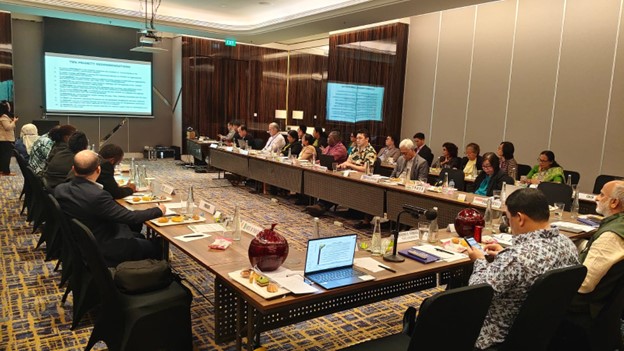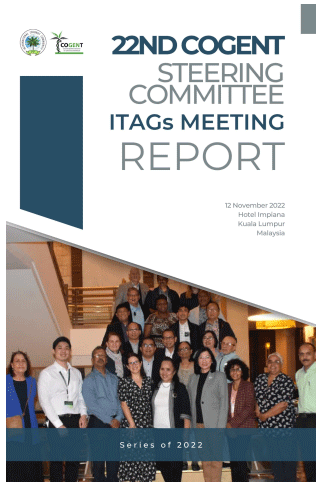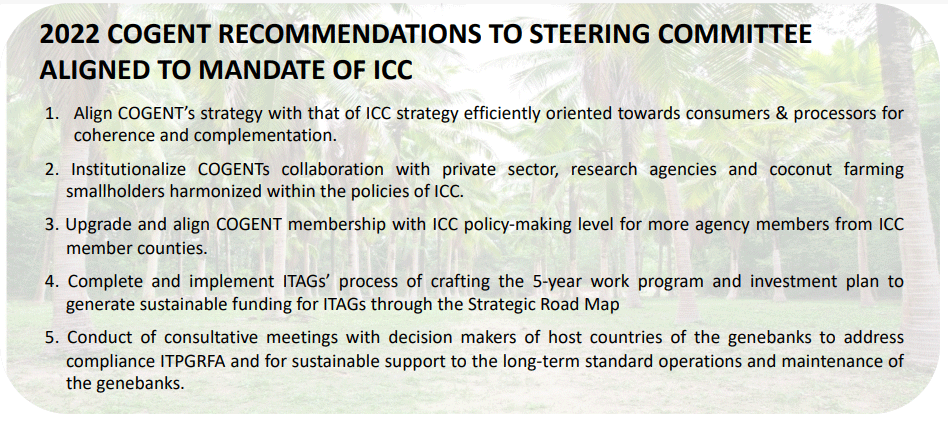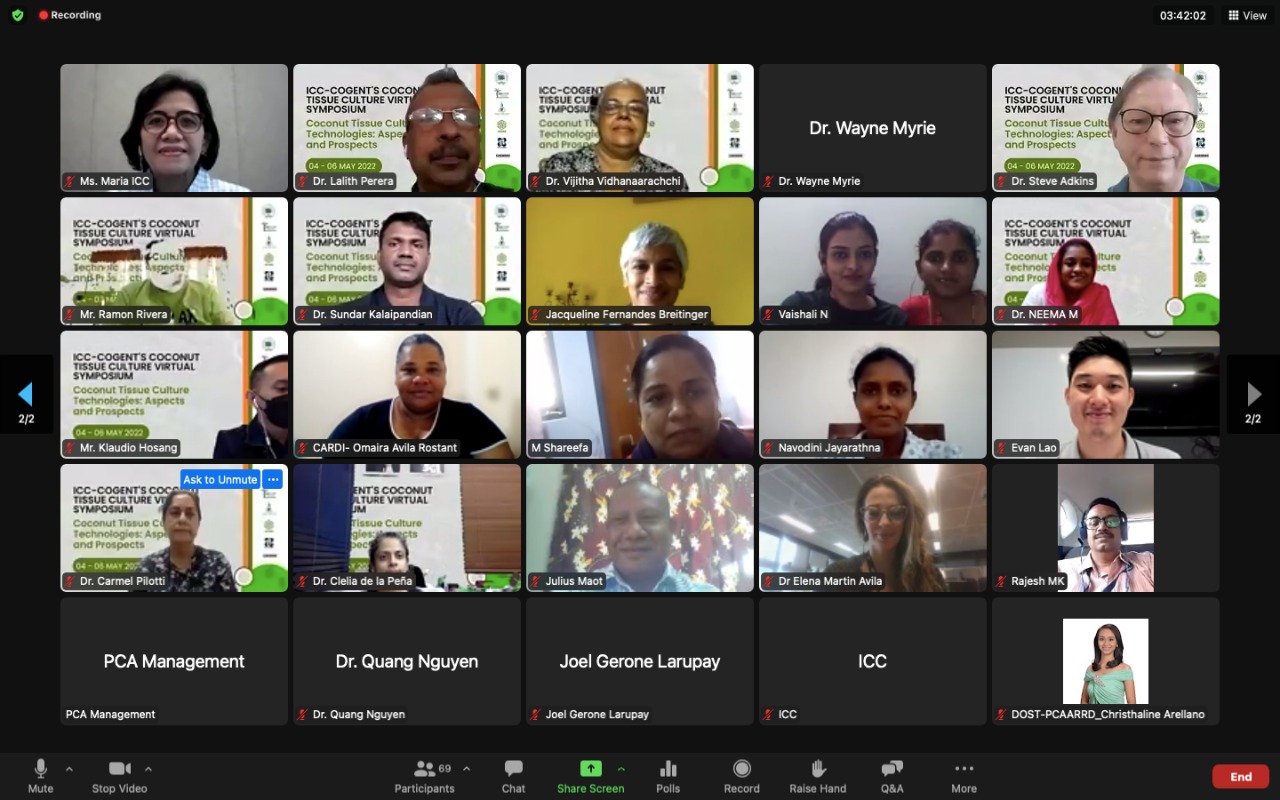Events
39th COGENT Steering Committee Meeting, 2024 - Westin Hotel Surabaya

Meeting Information:
- Event: 39th COGENT Steering Committee Meeting, held in conjunction with the COCOTECH meeting.
- Date: July 26, 2024.
- Location: Westin Hotel, Surabaya, Indonesia (hybrid platform).
- Host: Secretariat of the International Coconut Community (ICC).
- Theme: "Unlocking the Transformation pathways of COGENT under ICC, for furthering its efficiency and vitality as the times change."
Meeting Details:
The meeting focused on reviewing, reviving, and revitalizing COGENT's new directions within the ICC framework. Key discussions included:
- Introduction of new COGENT focal persons and genebank curators from ICC member countries, who shared insights into the challenges and support needed for their genebanks.
- Review of proposed administrative policies and governance changes for COGENT.
- Presentation by the COGENT Coordinator on the organization's current status, challenges, and future strategies, emphasizing germplasm conservation, research and development networking, and sustainable productivity.
- Presentations from partner organizations, the Crop Trust and CIRAD, regarding genebank strengthening and sustainable coconut conservation.
- Discussions on policy governance, capacity building, stakeholder consultations, investment promotion, and inclusive engagement.
- The meeting emphasized the importance of COGENT in coconut diversity conservation and utilization for the benefit of the coconut industry and farming communities.
- Recognition of support from FAO-ITGRFA, ACIAR-DFAT, and CIRAD.
************************
2022 Steering Committee, 12 November 2022 - Kuala Lumpur, Malaysia
 This 2022 Steering Committee was held on 12th November 2022, in Kuala Lumpur, Malaysia, after COCOTECH 2022. Amongst the 36 participants from 15 countries, six SC representatives, 13 official observers and nine genebanks were present (Côte d’Ivoire, Fiji, India, Indonesia, Jamaica, Malaysia, Mexico, Philippines, and PNG). Exchanges focused on: i) further strengthening COGENT’s International Thematic Groups (ITAGs) to improve support for coconut germplasm conservation, exchange and use; ii) endorsing the SC 2021 recommendations; iii) consolidating COGENTs Strategic Conservation Road Map (StratCORM), and iv) reporting on project outputs of the ACIAR-funded COGENT revitalization project. The Executive Director of ICC, COGENT coordinator (CC), PCA Administrator, COGENT SC acting Chair, and representatives from ACIAR and CIRAD provided encouraging messages. ACIAR-DFAT project was discussed and as major achievements of COGENT under the project such as i) an orderly transfer of the COGENT Secretariat from Bioversity to ICC; ii) Established technical support for implementing COGENT’s Global Strategy; iii) conducted rapid appraisals of the 5 ICGs, and iv) provided some initial support for their conservation activities, as well as the recommended income-generating components and international research collaboration that will help sustain the COGENT program and the national and international collections in the longer term. Major outputs were generated from the appraisals and series of consultative meetings, symposium and conferences. The ICG appraisals corroborated or identified major challenges including issues with land tenure, safe exchange, data management, scant resources, infrastructural deficiencies, staff shortages and other management issues. The appraisals examined the causes and effects of these challenges, and proposed solutions.
This 2022 Steering Committee was held on 12th November 2022, in Kuala Lumpur, Malaysia, after COCOTECH 2022. Amongst the 36 participants from 15 countries, six SC representatives, 13 official observers and nine genebanks were present (Côte d’Ivoire, Fiji, India, Indonesia, Jamaica, Malaysia, Mexico, Philippines, and PNG). Exchanges focused on: i) further strengthening COGENT’s International Thematic Groups (ITAGs) to improve support for coconut germplasm conservation, exchange and use; ii) endorsing the SC 2021 recommendations; iii) consolidating COGENTs Strategic Conservation Road Map (StratCORM), and iv) reporting on project outputs of the ACIAR-funded COGENT revitalization project. The Executive Director of ICC, COGENT coordinator (CC), PCA Administrator, COGENT SC acting Chair, and representatives from ACIAR and CIRAD provided encouraging messages. ACIAR-DFAT project was discussed and as major achievements of COGENT under the project such as i) an orderly transfer of the COGENT Secretariat from Bioversity to ICC; ii) Established technical support for implementing COGENT’s Global Strategy; iii) conducted rapid appraisals of the 5 ICGs, and iv) provided some initial support for their conservation activities, as well as the recommended income-generating components and international research collaboration that will help sustain the COGENT program and the national and international collections in the longer term. Major outputs were generated from the appraisals and series of consultative meetings, symposium and conferences. The ICG appraisals corroborated or identified major challenges including issues with land tenure, safe exchange, data management, scant resources, infrastructural deficiencies, staff shortages and other management issues. The appraisals examined the causes and effects of these challenges, and proposed solutions.

Advancing Youth Expertise in Coconut Tissue Culture: ICC’s Specialized Training Program

International Coconut Community (ICC) continues its commitment to empowering the next generation of coconut sector leaders through the Youth Empowerment Program (YEP). As part of the program's Physical Skills Development and Internship Phase, ICC is proud to introduce a specialized Tissue Culture Training Program in collaboration with leading coconut research institutions.
Empowering the Next Generation Through Innovation
Tissue culture technology plays a crucial role in the sustainable development of the coconut industry by enhancing productivity, ensuring disease-free planting materials, and accelerating the propagation of high-yielding coconut varieties. Recognizing the importance of this technology, ICC has integrated Tissue Culture Training into YEP’s internship component to equip youth with hands-on expertise in this advanced propagation technique.
Program Overview
- Hosted by renowned coconut research institutions, providing access to state-of-the-art laboratories.
- Training designed to provide practical exposure to micropropagation, somatic embryogenesis, and tissue culture protocols.
- Participants will gain direct laboratory experience, learning from experts in coconut biotechnology.
- The training is part of YEP’s larger mission to foster innovation, ntrepreneurship, and technical capacity among young professionals in the coconut sector.
Bridging Knowledge and Industry Needs
The Tissue Culture Training Program aligns with ICC’s strategic vision to modernize coconut farming and processing by introducing scientific advancements to young professionals. Participants will not only develop technical expertise but also gain insights into how tissue culture can revolutionize the coconut industry by addressing challenges such as low productivity, high production costs, and seedling shortages.
Partnership and Future Opportunities
This initiative strengthens ICC’s collaboration with leading research institutions, ensuring that young professionals are equipped with cutting-edge skills essential for the future of coconut biotechnology. Graduates of this training program will be encouraged to contribute to national and regional coconut development initiatives, fostering a new wave of expertise in tissue culture applications.
For more information on the Youth Empowerment Program and the Tissue Culture Training Initiative, stay connected with ICC and COGENT’s updates.
******************************
The ITAGs workshop at the COCOTECH conference in November 11, 2022, Hotel Impiana, Kuala Lumpur Malaysia
Activating a functional ITAGs will help ensure more effective conservation and use of coconut genetic resources. The ITAGs workshop was held after the COCOTECH conference in November 11, 2022, Hotel Impiana, Kuala Lumpur Malaysia. ITAGs workshop was held in hybrid mode (Face-to-Face and Virtual) and the agreed priorities were presented by each ITAG. The following key areas of priorities were agreed with the following objectives :
ITAG 1: i) to strengthen commitments to the ITPGRFA; ii) to sustain the ICGs/NCGs by valorizing CGR conservation through use; iii) lobby to the CropTrust to support the needs of the genebanks; iv) convene meetings with high-level policymakers and donors for commitment and support; v) establish a common, user-friendly germplasm data management system; and vi) establish standard operating procedure across ICGs; and vii) duplicate unique and priority accessions. Likewise, developing a standard Coconut Germplasm Data Management System in ICGs/NCGs was discussed by CIRAD geneticist Dr. Andrea Garavito aimed to harmonize coconut conservation and breeding. For ITAG 2: the focus is to identify and prioritize genotypes in ICGs/NCGs with special traits for breeding and mass propagation; ii) collaborate in coconut genomic mapping; iii) develop and apply highthroughput molecular markers to document germplasm collections; iv) conduct molecular breeding research studies that explore biotic and abiotic resilience; v) conduct of collaborative research with ITAG1 and ITAG3; vi) facilitate germplasm exchange and distribution for hybridization programs. In the case of ITAG 3: the plans agreed were i) finalize a standard Biosecurity Protocol aligned to relevant national/regional biosecurity policies; ii) collaborate with
ITAG 4 on clean TC planting material macropropagation and on mapping host-pathogen interactions for diagnostics using CTC technology; iii) develop and use digitized pest and disease epidemiological forecasting models as part of a standard pest and disease monitoring and control system (especially for genebanks); iv) organize an R&D network for a germplasm conservation and exchange IPM program to address major pest and disease problems aligned with ICC’s IPM network; and v) develop regional control strategies for key pests and diseases (especially Phytoplasmas and CRB). The ITAG 4 enumerated the following activities to be attained: i) Standardize / optimize agreed cross-country CTC and cryopreservation protocols (with final proofs); ii) share CTC protocol technologies and use for mass propagation and germplasm exchange; iii) build (junior) researchers’ capacity and monitor to assess how learning is applied; iv) establish / upgrade ICGs’ CTC and cryopreservation facilities; iv) commercialize proven CTC protocols with private sector engagement as end user, for benefit of small and large producers.
ICC and COGENT to organize stakeholders and enhance collaboration; v) Mobilize funding support for the Comprehensive Coconut Tissue Culture R & D Program; and vi) support ITAGs 1,2, and 3 for safe and effective germplasm conservation, exchange, mass propagation and breeding. Activities that are cross-cutting among ITAGs were identified as follows: i) facilitate recruiting local expertise to implement projects; ii) Identify key persons to contribute to proposal development; iii) integrate mid-career/ junior researchers TOR of membership and leadership should be reviewed; iv) prepare proposal for funding and showcase R & D outputs linking to national replanting and planting programs of major coconut growing countries.
Highlights of Virtual Symposium on coconut tissue culture technology with the theme “Coconut Tissue
Culture Technologies: Aspects and Prospects” on 04-06 May 2022 Via ZOOM
International Coconut Community through its program of the International Coconut Genetic Resources Network (COGENT) organized the three-day 2nd International Tissue Culture Symposium virtually from 4-6 May 2022. This is one of the activities of COGENT’s International Thematic Action Group (ITAG 4), who serve as the technical team working on In-vitro Culture and Cryopreservation.

OBJECTIVES
To establish the status of the tissue culture technology and challenges with reference to coconut conservation through knowledge sharing, synergies, and provision of support toward achieving more sustainable coconut industry development. Specifically, the symposium aims to present advances, promote the merits, unify experts in bridging gaps and provide strategic platform for technology transfer and develop mechanism of protecting intellectual property rights. There are six symposium sessions with high calibre experts from various parts of the globe. The 2nd International Coconut Tissue Culture was organized to lay down what were achieved in coconut tissue culture, the breakthroughs, prospects, and its application, as well as what needs to be achieved to address industry challenges. In summary there are three major segments in the Symposium that have been tackled comprehensively by our elite and high calibre speakers in their respective areas of expertise. These are Technology Development, Perceived Application and Prospects.
1st International Scientific Conference on Coconut Research and Development
27-30 November 2023 - Los Banos, Laguna, Philippines ( Hybrid )
Theme: Unity in the Scientific Community to Protect Coconut Diversity and Boost Coconut Linked Livelihoods
 Conduct of scientific conferences is a plausible approach to have a better assessment of the status of the scientific development in the relevant field of coconut research to support conservation, exchange and use of genetic resources such as agronomy, crop protection, biotechnology, breeding and tissue culture. These are the priority thematic agenda that need to be given full attention and support to ensure the sustainability and enhancement of the genebank management towards conservation and better germplasm exchange. This will serve as the platform for researchers to introduce and present their works to establish connectivity so that they can exchange knowledge and share significant research outputs. Moreover, this will expand the scope of COGENT’s link to the scientific communities, not only from the current membership of ITAGs but also to engage the academic and research institutions working on these fields of coconut thematic areas. This will also engage the production sector as the basic element of the supply value chain of the industry. Through the conference, research directions will be guided by the feedback and need assessment of the industry stakeholders, and the farmers in particular.
Conduct of scientific conferences is a plausible approach to have a better assessment of the status of the scientific development in the relevant field of coconut research to support conservation, exchange and use of genetic resources such as agronomy, crop protection, biotechnology, breeding and tissue culture. These are the priority thematic agenda that need to be given full attention and support to ensure the sustainability and enhancement of the genebank management towards conservation and better germplasm exchange. This will serve as the platform for researchers to introduce and present their works to establish connectivity so that they can exchange knowledge and share significant research outputs. Moreover, this will expand the scope of COGENT’s link to the scientific communities, not only from the current membership of ITAGs but also to engage the academic and research institutions working on these fields of coconut thematic areas. This will also engage the production sector as the basic element of the supply value chain of the industry. Through the conference, research directions will be guided by the feedback and need assessment of the industry stakeholders, and the farmers in particular.
Through researchers linked to COGENT’s four international thematic action groups (ITAGs), this conference will address the issues associated with updating and implementing COGENT’s Global Strategy for conserving and using coconut genetic resources. The ITAGs focus on i) Ex and In-situ Conservation; ii) Genomics and Breeding; iii) Phytopathology, Entomology and Germplasm movement, and iv) In vitro tissue culture and cryopreservation. The global economic outlook for coconut is extremely positive, as global demand continues to increase. Coconut offers an increasingly relevant, climate-resilient component of production systems worldwide.
Addressing supply requirements and product quality are essential for achieving demand-driven industry prosperity. Part of this will be through safely harnessing improved germplasm, and using quality planting material to ensure higher and more sustainable productivity (Johnson et al., 2023). However, coconut diversity is seriously threatened by climate change, rising sea levels, and changes in land use, including urbanization. Availability of a wide coconut genetic diversity is important for breeding climate-resilient, pest-resistant, productive varieties, which will better cater for industry needs, including marginalized groups (often women). Globally, hundreds of millions of unproductive, senile palms also need replacing with better varieties, as part of the Global COGENT Strategy,
From the recent consultative workshop of the International Thematic Action Groups (ITAGs) of COGENT, the key concerns and areas of collaborative research activities were identified. From these key areas, scientific processes have to be undertaken to strategically address the challenges and gaps to have better conservation, exchange and use of the germplasm. Currently, limited resources and researchers work on these various aspects, thus, it is imperative to create a big network of coconut researchers as a forthright attempt to pool efforts and establish the global advancement of research initiatives. As such, this will open up the coconut research arena to the promising works and generate innovations that will strengthen the foundation of science-based support to conservation, exchange and use the coconut genetic resources and the technologies as tool in modernizing coconut farming. This scientific conference was conceptualized as the logical platform to gather experts, scientists, researchers and academic practitioners working on coconut research with the engagement of the private and production sector. This will expand the reach of research works and to provide the appropriate use of technologies that pertains and related to conservation, exchange and use of genetic resources with the feedback from private sector and farmers group as ultimate end-users.
